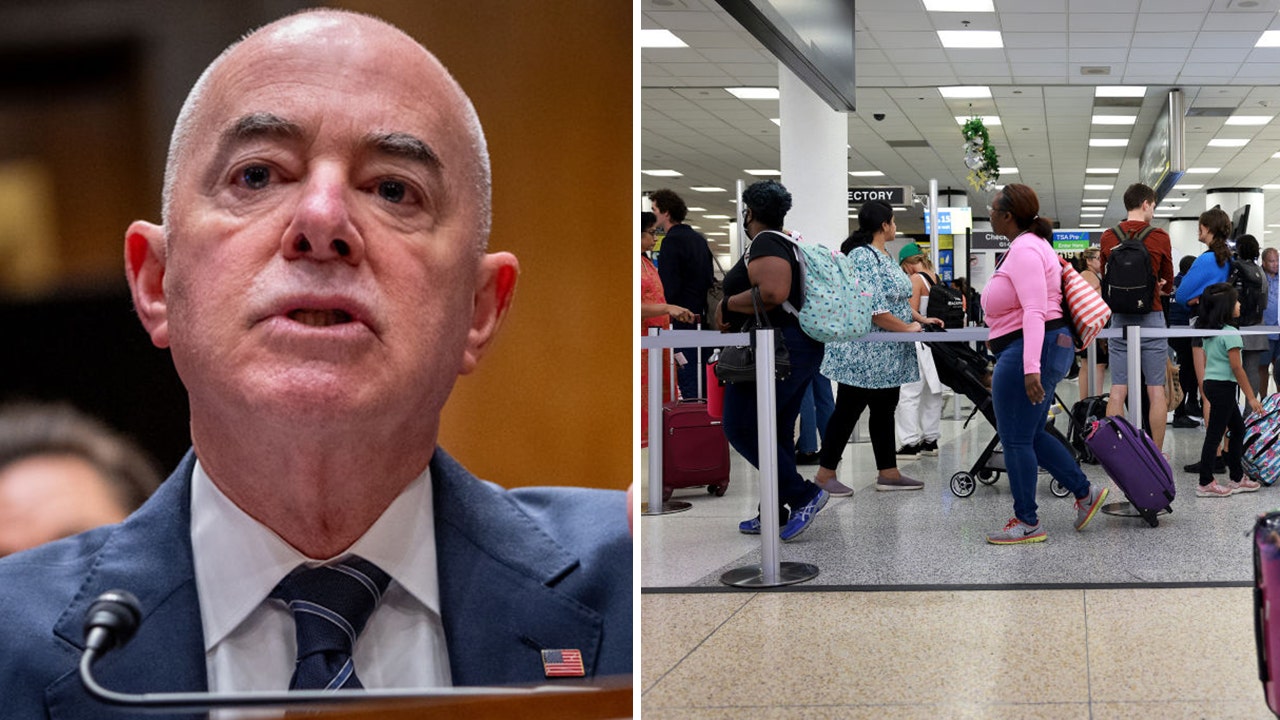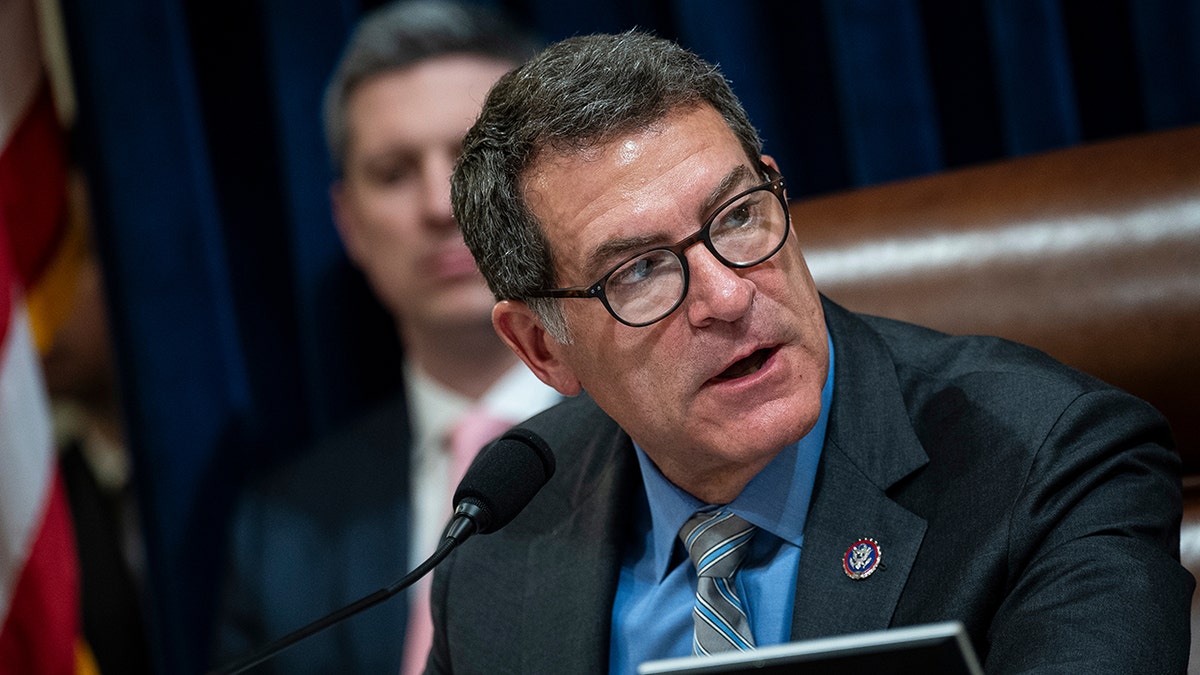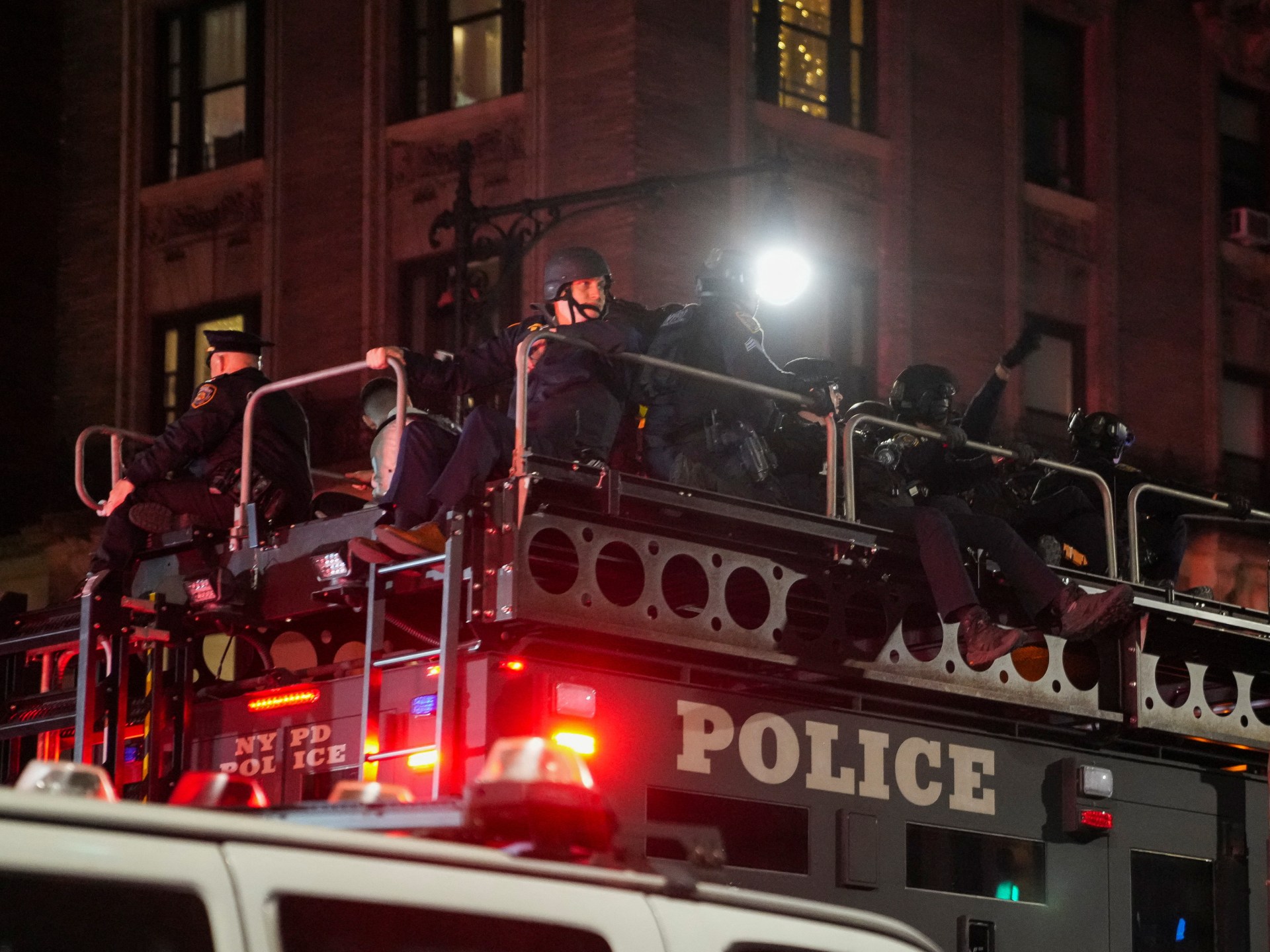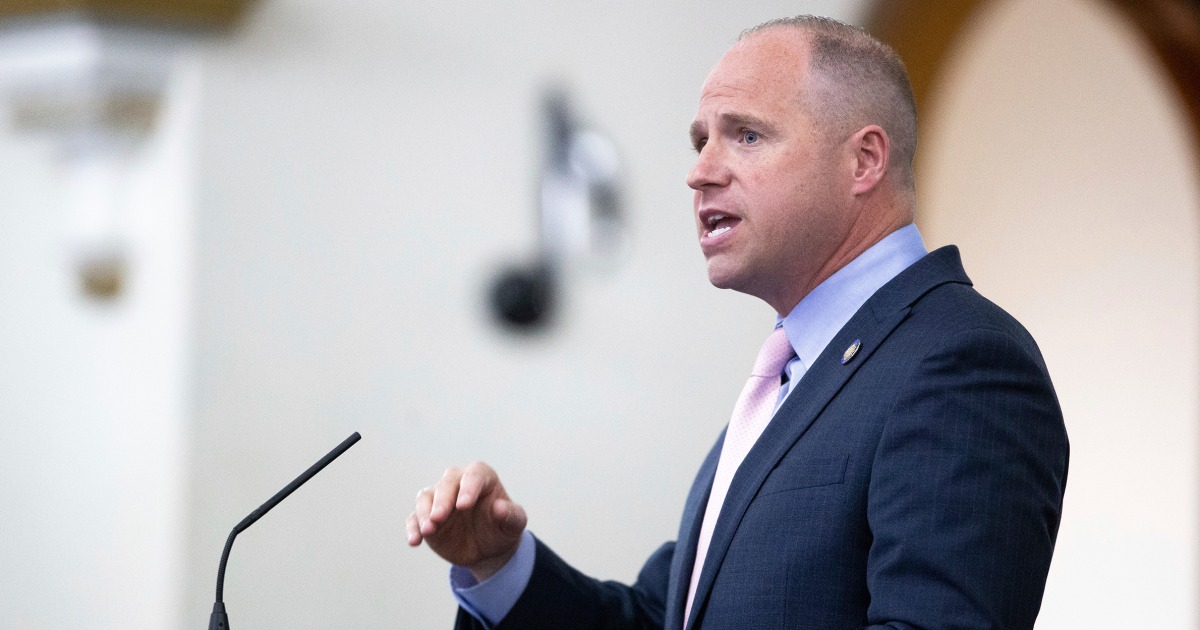Politics
NASA Picks Blue Origin-Led Group to Build Moon Lander for Artemis V Mission

On the second try, Jeff Bezos and his rocket company have won a contract to take NASA astronauts to the surface of the moon.
NASA announced on Friday that it had awarded a contract to Mr. Bezos’ company, Blue Origin, to provide its Blue Moon lander for a lunar mission that is currently scheduled to launch in 2029.
The mission, Artemis V, is another key piece of NASA’s Artemis program, which is to send astronauts back to the moon as part of an effort to explore the south pole region. Astronauts are to land on the moon in a vehicle built by SpaceX for the Artemis III and IV missions.
”We want more competition,” Bill Nelson, the NASA administrator, during the event on Friday at NASA headquarters in Washington on Friday. “It means that you have reliability. You have backups.”
NASA will pay $3.4 billion to Blue Origin, and John Couluris, Blue Origin’s vice president for lunar transportation, said the company was contributing “well north” of that amount to the development effort.
The winning of the contract could start a promising rebound year for Blue Origin after a number of delays and setbacks. That includes the failure of one of its New Shepard vehicles, which travel to space but not to orbit, during a launch last September that carried experiments but no passengers. Blue Origin has identified the cause and hopes to resume New Shepard flights involving both space tourists and scientific cargo later this year.
And some hardware manufactured by Blue Origin might finally be used on an orbital mission in the coming months. The company built engines for the booster stage of the Vulcan rocket being developed by the United Launch Alliance, a joint venture of the aerospace giants Boeing and Lockheed Martin.
Blue Origin might also provide some public glimpses of New Glenn, a much larger rocket that is to launch payloads to orbit.
For the lunar lander contract, Blue Origin, collaborating with other aerospace companies including Boeing and Lockheed Martin, beat a second team led by Dynetics, a defense company based in Huntsville, Ala. Dynetics, a subsidiary of Leidos of Reston, Va., had enlisted the help of the aerospace contractor Northrop Grumman for its bid.
Blue Origin and Dynetics were disappointed losers in 2021 when NASA awarded a $2.9 billion contract to SpaceX to build a variation of its giant Starship vehicle that would land astronauts on the moon for the first time in more than half a century.
The two companies protested the decision, especially because NASA officials originally aimed to award two contracts.
That would have paralleled successful efforts by NASA that turned over to private companies the transportation of cargo and crew to the International Space Station. Competition helps drive costs down and provides redundancy if something goes wrong, agency officials have said.
But in giving just one award to SpaceX, NASA officials said there was not enough money in their budget for a second lander. SpaceX’s $2.9 billion bid was the lowest bid by far. Blue Origin’s proposed design had a price tag of $6 billion, and the one offered by Dynetics was even more expensive.
The federal Government Accountability Office rejected the protests of the two companies. Blue Origin then sued in federal court and again lost.
Last year, after winning a larger budget from Congress, NASA announced a competition for a second lunar lander. Dynetics and Blue Origin decided to compete again, although there was some shuffling of the companies participating in the efforts. Northrop Grumman, which was part of Blue Origin’s original proposal, switched to the Dynetics team.
Blue Origin added to its team Boeing; Astrobotic, a small Pittsburgh company that is developing robotic lunar landers; and Honeybee Robotics, a space technology company that Blue Origin bought last year.
The Blue Origin lander, which is designed to take two astronauts to the moon’s south pole region, will not get to the moon for quite a while.
SpaceX’s initial $2.9 billion contract was to provide the lander for the first moon landing during Artemis III, which is currently scheduled for late 2025 but is likely to slip to 2026 or later. In November, NASA exercised a $1.15 billion option in that contract for SpaceX to provide a lander for Artemis IV as well, a mission that is scheduled for 2028.

Politics
Pennsylvania House votes to criminalize Bluetooth stalking

Pennsylvania took a step Tuesday toward becoming the latest state to punish someone for using a Bluetooth-connected device to track someone without their permission.
The state House of Representatives voted 199-1 to approve legislation that would make using a tracking device to secretly track another person part of Pennsylvania’s laws against stalking. The crime would be punishable as a third-degree misdemeanor, or up to 90 days in jail.
The bill goes to the Senate, where a separate bill is pending that would make the crime a second-degree misdemeanor, or punishable by up to two years in jail.
DAVE MCCORMICK CLINCHES GOP NOMINATION IN PENNSYLVANIA RACE: ‘ONE OF THE MOST IMPORTANT RACES IN THE COUNTRY’
Most states have a provision in state law that prohibits remote tracking, while others are adding it. Ohio is considering such legislation, Florida is increasing penalties for using such a device and Kentucky approved a new law last year.
Bluetooth-controlled devices made by various tech giants or digital apps installed on a mobile phone can secretly track the movements of another person.
The Pennsylvania Capitol is viewed Dec. 16, 2021, in Harrisburg, Pennsylvania. (AP Photo/Matt Rourke, File)
The House bill’s passage Tuesday comes a few weeks after a federal judge denied Apple’s motion to dismiss a class-action lawsuit contending that the tech giant hasn’t done enough to prevent stalkers from using its AirTag devices to track victims.
Apple’s $29 AirTags have become popular items since their 2021 release, helping users keep tabs on the location of anything from lost keys to wallets and luggage.
But stalkers have also taken advantage of AirTags and similar tracking devices, and dozens of plaintiffs sued Apple in 2022, contending that AirTag users had stalked them. They said its safety features are inadequate and that Apple should have done more to protect victims after AirTags “revolutionized the scope, breadth, and ease of location-based stalking.”
Apple has condemned any malicious use of the product. It argued in court that it “took proactive steps” to deter misuse and that it shouldn’t be liable for damage caused by third parties.
Last year, Apple partnered with Google to set standards for fighting secret surveillance with tracking devices.
Politics
Column: Donald Trump was just fined for contempt of court. Could he go to jail next time?

Judge Juan M. Merchan has, in his soft-spoken but hard-nosed way, told Donald Trump something no other court has over the course of his many civil and criminal cases: He’s down to his last chance.
Merchan ruled Tuesday on contempt motions brought by the Manhattan district attorney’s office in response to Trump’s serial violation of a gag order prohibiting public statements about witnesses, jurors and others connected to the hush money case. The judge was calm, straightforward and utterly undramatic in announcing that he had found violations in nine of the 10 instances cited by prosecutors.
It was Merchan’s written order that contained the thunder. It forcefully and convincingly rejected Trump’s arguments that the order permits him to respond to supposed political attacks or excludes reposting of others’ social media comments. (It was when Trump lawyer Todd Blanche made those arguments in court that Merchan ominously warned he was in danger of “losing all credibility.”)
Merchan really lowers the boom near the end of the written ruling, advising Trump in no uncertain terms that if he insists on forcing the judge’s hand, he is prepared to put him in jail.
“Defendant is hereby warned,” Merchan wrote, “that the Court will not tolerate continued willful violations of its lawful orders and that if necessary and appropriate under the circumstances, it will impose an incarceratory punishment.”
That’s appropriate given the limited legal tools at Merchan’s disposal.
Other courts, for example the federal court handling the Jan. 6 case, can take several intermediate steps to manage a recalcitrant defendant. And those courts have done back flips to avoid putting Trump in jail, being very aware of the political cyclone it could occasion.
But Merchan’s court is more constrained. New York law essentially gives him the option of a fine of up to $1,000 for each act of contempt or a jail term of up to 30 days.
And as Merchan wrote, “While $1,000 may suffice in most instances to protect the dignity of the judicial system, to compel respect for its mandates and to punish the offender for disobeying a court order,” it doesn’t do the trick in the case of a defendant as wealthy as Trump.
Given this dilemma, Merchan could go through several rounds of thousand-dollar fines. But he left it to Trump to decide whether to play the martyr and go to jail for political reasons.
If the former president is determined to continue on his defiant course, Merchan’s unavoidable responsibility will be to have him ushered to a jail cell, beginning perhaps with a short stay in the holding cell at the back of his court. The judge must recognize that his credibility and that of the proceedings are at risk if he lets Trump continue to thumb his nose at his orders without more serious consequences.
Merchan has already scheduled a hearing Thursday to adjudicate four additional alleged instances of contempt on Trump’s part. Don’t expect him to put Trump in custody for those: They occurred before he had issued the clear warning in Tuesday’s opinion.
But if Merchan does find those to be more willful violations of his orders, they look to be the last he will tolerate without a dramatic escalation of the penalties. The lines are drawn; Trump is almost out of chances and knows it.
The defendant may nevertheless dare Merchan, as he did another judge threatening to jail him, to “make my day.” But he had better not be bluffing, because he’s up against a judge who isn’t.
Harry Litman is the host of the “Talking Feds” podcast and the Talking San Diego speaker series. @harrylitman
Politics
DHS docs reveal where paroled migrants under controversial Biden flight program are landing

EXCLUSIVE: Department of Homeland Security (DHS) data is revealing the more than 50 cities in the U.S. that hundreds of thousands of migrants have flown into via a controversial parole program for four nationalities — with the vast majority entering the U.S. via airports in Florida.
During an eight-month period from January through August 2023, roughly 200,000 migrants flew into the U.S. via the program. Of those, 80% of them, (161,562) arrived in the state of Florida in four cities: Miami, Ft. Lauderdale, Orlando and Tampa Bay, according to DHS data obtained via a subpoena by the House Homeland Security Committee and provided to Fox News.
The policy was first announced for Venezuelans in October 2022, which allowed a limited number to fly or travel directly into the U.S. as long as they had not entered illegally, had a sponsor in the U.S. already, and passed certain biometric and biographical vetting. The program does not itself facilitate flights, and migrants are responsible for their own travel.
‘ILLEGAL PROGRAM’: GOVERNOR VOWS TO FIGHT BIDEN FLYING MIGRANTS INTO US
Secretary of Homeland Security Alejandro Mayorkas speaks at a news conference on Wednesday, May 10, 2023, ahead of the lifting of Title 42. (AP Photo/Kevin Wolf)
In January 2023, the administration announced that the program was expanding to include Haitians, Nicaraguans and Cubans and that the program would allow up to 30,000 people per month into the U.S. It allows for migrants to receive work permits and a two-year authorization to live in the U.S. and was announced alongside an expansion of Title 42 expulsions to include those nationalities. By the end of February 2024, more than 400,000 nationals have arrived under the parole program, according to Customs and Border Protection (CBP) data.
DHS Secretary Alejandro Mayorkas recently said the program is a “safe and orderly way to reach the United States” and has “led to a reduction in numbers of those nationalities.”
“It is a key element of our efforts to address the unprecedented level of migration throughout our hemisphere, and other countries around the world see it as a model to tackle the challenge of increased irregular migration that they too are experiencing,” Mayorkas said.
CLICK HERE FOR MORE IMMIGRATION COVERAGE
The top 15 cities migrants flew into during the eight-month window are:
1) Miami, Florida: 91,821
2) Ft. Lauderdale, Florida: 60,461
3) New York City, New York: 14,827
4) Houston, Texas: 7,923
5) Orlando, Florida: 6,043
6) Los Angeles, California: 3,271
7) Tampa, Florida: 3,237
8) Dallas, Texas: 2,256
9) San Francisco, California: 2,052
10) Atlanta, Georgia: 1,796
11) Newark, New Jersey: 1,498
12) Washington, D.C.: 1,472
13) Chicago, Illinois: 496
14) Las Vegas, Nevada: 483
15) Austin, Texas: 171
DHS also revealed in the subpoena response that as of October 2023, there were about 1.6 million applicants waiting for DHS approval to fly to the U.S. via the parole program.
DHS said in its subpoena response, “All individuals paroled into the United States are, by definition, inadmissible, including those paroled under the CHNV processes.”

Representative Mark Green, a Republican from Tennessee and chairman of the House Homeland Security Committee, during a House Homeland Security Committee hearing in Washington, DC, US, on Wednesday, Jan. 10, 2024. (Getty Images)
Homeland Security Committee Chair Mark Green, argues that the program exceeds parole powers put in place by Congress. The authority is to be used on a “case-by-case basis for urgent humanitarian reasons or significant public benefit.”
MAYORKAS CALLS POLICY TO LET 30K MIGRANTS FLY IN EACH MONTH A ‘KEY ELEMENT’ OF BORDER AFTER LEGAL WIN
“These documents expose the egregious lengths Secretary Mayorkas will go to ensure inadmissible aliens reach every corner of the country, from Orlando and Atlanta to Las Vegas and San Francisco,” he said in a statement. “Secretary Mayorkas’ CHNV parole program is an unlawful sleight of hand used to hide the worsening border crisis from the American people. Implementing a program that allows otherwise inadmissible aliens to fly directly into the U.S. — not for significant public benefit or urgent humanitarian reasons as the Immigration and Nationality Act mandates — has been proven an impeachable offense.”
He then made reference to the House’s efforts to impeach Mayorkas. The chamber impeached him, but the Senate has not held a trial on the articles.
“Following our subpoena and the House’s impeachment vote — especially in light of the Senate’s complete failure to fulfill its duty to hold a trial — the Committee will not rest until this administration is finally held accountable for its open-borders agenda and its devastating impact on our homeland security,” he said.
Green’s arguments against the program have been echoed in a lawsuit by multiple states, who have sued to block the program. The 20 states argued that it “amounts to the creation of a new visa program that allows hundreds of thousands of aliens to enter the United States who otherwise have no basis for doing so.”
The lawsuit was struck down by a district judge, but states have appealed. Florida Gov. Ron DeSantis’ administration has repeatedly said it is confident the lawsuit will ultimately be successful.
“Biden’s parole program is unlawful, and constitutes an abuse of constitutional authority. Florida is currently suing Biden to shut it down, and we believe that we will prevail,” press secretary Jeremy Redfern told Fox News.
DHS has said that those who enter the U.S. under the program undergo and clear a “robust security vetting” as well as other eligibility criteria.
“These processes are publicly available online, and DHS has been providing regular updates on their use to the public. These processes are part of the administration’s strategy to combine expanded lawful pathways with stronger consequences to reduce irregular migration, and have kept hundreds of thousands of people from migrating irregularly,” a spokesperson told Fox News Digital this month.
-

 Education1 week ago
Education1 week agoVideo: Dozens of Yale Students Arrested as Campus Protests Spread
-

 World1 week ago
World1 week agoEU sanctions extremist Israeli settlers over violence in the West Bank
-

 Politics1 week ago
Politics1 week agoDemocrats hold major 2024 advantage as House Republicans face further chaos, division
-

 Politics1 week ago
Politics1 week agoFetterman hammers 'a–hole' anti-Israel protesters, slams own party for response to Iranian attack: 'Crazy'
-

 World1 week ago
World1 week agoPeriod poverty still a problem within the EU despite tax breaks
-

 Politics1 week ago
Politics1 week agoA battle over 100 words: Judge tentatively siding with California AG over students' gender identification
-

 Movie Reviews1 week ago
Movie Reviews1 week agoShort Film Review: Wooden Toilet (2023) by Zuni Rinpoche
-

 News1 week ago
News1 week agoUniversal Studios Tram Crashes, 15 Injured, 1 Critical















